Maiden Warrior Madness
Discussing Carol Clover's scholarship and the existence of maiden warriors
For this week’s substack, I’d like to discuss the supplemental reading for The Saga of the People of Laxardal: Carol Clover’s “Regardless of Sex: Men, Women and Power in Early Northern Europe.” This article pairs well to answer some of the questions I had while reading for this week. Some of these questions include: How were women afforded so much agency? How could these women, such as Godrun, possess property and power? In Clover’s insightful article, she discusses how the gender binary functioned in medieval Scandinavian society. Clover argues that while gender existed, women and men could behave in certain ways that could allow them to transcend their gender. Her discussion of gender helps the reader to cope with the uniquely feminist nature of The Saga of the People of Laxardal.
Perhaps one of the most interesting points discussed by Clover is her discussion of inheritance regarding men who bore only daughters. Clover writes, “In other words, when the slain man has no male relatives in the first tier (no son, brother, or father) but does have a daughter (unmarried), that daughter shall function as a son” (369-370). This detail was astounding to me. As Clover continues to discuss the role of surrogate sons, she mentions their presence in other sagas. She states, “Just where and when and how completely the surrogate son clause obtained we have no idea, although the ubiquity of ‘maiden warrior’ legends–legends of unmarried, brotherless daughters who on the death of their fathers become functional sons, even dressing and acting the part–suggests that idea was very much alive in the public mind” (Clover 370). HUH? You mean to tell me that Clover inferred that the surrogate son clause was pervasive in Scandinavian culture because of the prevalence of these badass female warriors in other sagas.
The idea of the maiden warriors was so interesting to me that I began to research examples of them in other sagas. The discovery of these warrior women answered one of my questions that I found myself asking in class: Is The Saga of the People of Laxardal uniquely feminist or were there other sagas that depicted women in a similar fashion? While there is no doubt that the woman centric narrative of The Saga of the People of Laxardal is valuable and distinct, there are other sagas that portray women in a positive light.
One of the most notable is Hervor from The Saga of Hervor and Heidrek. In this saga, Hervor is a young girl with no siblings and must serve as her father’s heir following his death. She fights and dresses as a powerful male warrior. Even after her marriage, she continues to go on the masculine journeys where she brings honor to her family. Only after the birth of her two sons does she return to her status as a woman and act accordingly. In another academic article entitled “Maiden Warriors and Other Sons,” Carol Clover offers a valuable look into maiden warriors and what their existence says about medieval gender at large. Here, she discusses the incredible agency and power obtained by Hervor.
Maiden warriors are one of the most interesting examples of the medieval gender binary. Women, such as Hervor possessed more power than some men. In her case, she was able to keep it within her marriage. Sagas, such as The Saga of the People of Laxardal and The Saga of Hervor and Heidrek speak to larger ideas of medieval society. Not only do they excite us with stories of strong, heroic women, they also surprise us with their shockingly progressive perspective on gender.
Works Cited:
Clover, Carol J. “Maiden Warriors and Other Sons.” The Journal of English and Germanic Philology, vol. 85, no. 1, 1986, pp. 35–49. JSTOR, http://www.jstor.org/stable/27709600. Accessed 13 Mar. 2024.
Clover, Carol J. “Regardless of Sex: Men, Women, and Power in Early Northern Europe.” Representations, no. 44, 1993, pp. 1–28. JSTOR, https://doi.org/10.2307/2928638. Accessed 13 Mar. 2024.






I think one of my favorite theories that explains the high agency the women have in this book is that perhaps the author was simply a woman. It seems as the simplest explanation to me to be honest, because I just find it hard to believe "surrogate son" or not, the women would be such a forefront of a store with this much agency about them and be written by a man during the medieval period but, who knows, it's a mystery unfortunately.
Hi, Kat! Nice post here! The quote you point out from the article struck me as well. In fact, there were quite a few points that stood out to me. One in particular being that men would often diminish each other's value by insulting each other—these insults would bring the men down by comparing them to women. Another point that Clover makes is how sodomy was not considered a homosexual act unless you were on the receiving end as that places you in a more feminine position. It is very interesting, and also a bit dismaying, to see how honor is placed among people in accordance to their gender roles, which you make note of in your post.